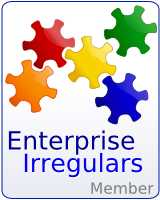Tufts Breakfast Speaker Series - Changing tides of PR
I went to an alumni event (early) yesterday morning: PR veteran Peter Himler speaking on changes in PR. Went for two reasons: (1) keep active in my alumni community and (2) given the work my group at SAP is doing in social media wanted to get a PR professional’s insights.
As I thought it would largely deal with "regular" PR issues, my intention was to ask a couple questions on social media in hopes of spending a few minutes on the subject. It turns out, we spent most of the time speaking about blogging, search and the like. The fact that an old school PR guy would spend so much time on this subject re-enforces to me that we are right to be pushing use of social media within SAP.
Peter re-enforced the idea that people get their news differently now. Instead of sending hundreds of press releases out by email or regular mail, why not let those who are interested in your company subscribe to an RSS feed.
I asked a question about what metrics are applicable to guage how effective a company is in managing its image/message in the blogosphere. Peter mentioned Intelliseek rankings, but pointed out that many metrics are probably anectodal. Probably, but in order to continue to push the idea of blogging through(or past) our media relations folks, we're going to have to show that we're being effective in conveying "our" message. How to measure this effectiveness is still not as clear as I'd like. I’m going to ping Peter periodically as he’s likely to figure it out.
Another observation is around the reaction of a representative of the New York Times. She made some insightful comments, but I sensed that she felt there was an inherent danger to so many non-journalists blogging. Her concern was around the factuality and bias of what is being written and that most bloggers were not trained journalists. Maybe. However, an individual blogger has as much right to post on his/her blog as the NYT does to write an article. Just as I (dis)trust the Times, I need to make a judgment about the bias and accuracy of those blogs that I choose to read. I think the watchword here is: Caveat Emptor.
As I thought it would largely deal with "regular" PR issues, my intention was to ask a couple questions on social media in hopes of spending a few minutes on the subject. It turns out, we spent most of the time speaking about blogging, search and the like. The fact that an old school PR guy would spend so much time on this subject re-enforces to me that we are right to be pushing use of social media within SAP.
Peter re-enforced the idea that people get their news differently now. Instead of sending hundreds of press releases out by email or regular mail, why not let those who are interested in your company subscribe to an RSS feed.
I asked a question about what metrics are applicable to guage how effective a company is in managing its image/message in the blogosphere. Peter mentioned Intelliseek rankings, but pointed out that many metrics are probably anectodal. Probably, but in order to continue to push the idea of blogging through(or past) our media relations folks, we're going to have to show that we're being effective in conveying "our" message. How to measure this effectiveness is still not as clear as I'd like. I’m going to ping Peter periodically as he’s likely to figure it out.
Another observation is around the reaction of a representative of the New York Times. She made some insightful comments, but I sensed that she felt there was an inherent danger to so many non-journalists blogging. Her concern was around the factuality and bias of what is being written and that most bloggers were not trained journalists. Maybe. However, an individual blogger has as much right to post on his/her blog as the NYT does to write an article. Just as I (dis)trust the Times, I need to make a judgment about the bias and accuracy of those blogs that I choose to read. I think the watchword here is: Caveat Emptor.





